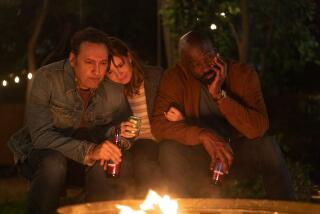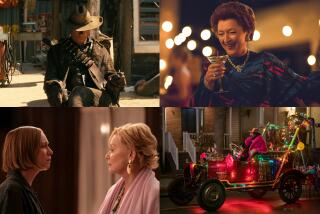Critic’s Notebook: Last thoughts on ‘Breaking Bad’
“Breaking Bad,” the sweet little show that captured the hearts of approximately one-fortieth of a nation (more like one-thirtieth, if we reckon by the finale), sent itself into history Sunday with a well-balanced episode that stayed on mission, touching themes present since its first season and consonant even with what we might characterize as the series’ faults. (Quirks might be a better word.) I found it intellectually and aesthetically satisfying without being particularly moved by it -- most of these characters stopped being real to me some time ago -- and send congratulations to all concerned from my corner of casual investment.
Anyway, a few parting thoughts on a show I won’t have to think about much again.
Fantasy: For all the handsome grit and arty naturalism of its staging, and its credible emotional through lines, “Breaking Bad” relied again and again on the super-complicated mechanics of an action film, in which 8 million things need to go right to create a single desired effect. The series finale, which involved not just a robot machine gun -- The Robot Machine-Gun Caper -- but also the even less reliable gears and pulleys of uncannily understood and manipulated human behavior, was in the spirit of the killing of Gus Fring (Giancarlo Esposito) and of Gale Boetticher (David Costabile) and of the Methylamine train robbery.
Such Rube Goldberg contraptions are fun -- more so than a man walking into a room, pulling out a gun and shooting, though that is the more likely thing -- and might make a certain sort of viewer nod his head and say, “Cool.” But it’s also part of the character of milquetoast-turned-meth-maker Walter White (Bryan Cranston) -- his remote, remote-control method of dealing death. It’s what made his messy, frightened, face-to-face killing of Jonathan Banks’ Mike Ehrmantraut so powerful -- more powerful, to me, than anything in the finale.
PHOTOS: ‘Breaking Bad’ scenes | Every season, every episode
Algebraic: As many observed and creator-show runner Vince Gilligan has said, Walt turned from anti-hero to outright villain at some point, but there was always somebody worse in the room. In the age of the bad-good/good-bad guy, the formula is to ensure that however bad your bad guy is, there is a badder one around. This is a cheat, of course, but a common one. It was true throughout the series, and not merely of his criminal rivals or police pursuers (Dean Norris’ Hank was more of a clown than he needed to be); that portion of the audience for whom Walt could do no wrong were happy to project their animus onto wife Skyler (Anna Gunn), certainly more sinned against than sinning. But the introduction of “dead-eyed Opie” Todd Alquist (Jesse Plemons) and his Nazi kin was the endgame move that allowed Walt to go out a hero -- a rescuer, a provider, a settler of scores, with people who really needed their scores settled. This was all good math.
Tone: Like most of what came before, the last episode was (mostly) quiet without being subtle -- Gilligan made sure you saw everything you needed to see, often to confirm what you long felt to be true. But I appreciated the quiet, and even the relative efficiency of the violence -- that it wasn’t a “Scarface” ending. It wasn’t a particularly suspenseful episode, though at several crucial points a scene could easily have gone one way or the other, but I watched with interest (at least) to see what road finale writer-director Gilligan would take. Each seemed the right one, certainly from the standpoint of providing a satisfying group experience that took into account the needs and desires of the audience.
Love: The title of the last episode was “Felina,” from the Marty Robbins’ song “El Paso,” a cassette of which Walt pops into his car stereo early in the episode; it’s a song about a murderer driven back to a dangerous place by love and winding up shot. In the most thorough send-off since David Tennant left “Doctor Who,” Walt got scenes with all his significant others, his family (though he watched Walt Jr. only from afar), protegee-partner Jesse Pinkman (Aaron Paul) and, most significantly and finally (and even comically), his meth-making gear. Hello, gas mask, old friend. Who was Felina? All of the above, of course, gas mask included. There was a lot of closure about, but it didn’t feel particularly gratuitous, or more sentimentally weighty than the characters or structure could bear.
VIDEO: ‘Breaking Bad’ parodies
Excellence: “I was good at it,” Walter says of his meth-making (and empire-building, by extension), and this is, oddly and of course, what makes him relatable: Everyone wants to feel good at something, and we all feel good about what we’re good at. And we like to see it in others. That’s why everyone loved Mike Ehrmantraut; it’s what made Gus Fring appealing, if that’s the word, as well. (Even Bob Odenkirk’s Saul Goodman, in his way.) And why I’ll be watching “MasterChef Junior” (Fox, Fridays).
Walt, hero, anti-hero? Gilligan (and Cranston) managed to turn off the “anti-” for a moment in the end. But this character was, more than any other, the source of my exhaustion with this sort of character. May we have a break now?
Good and evil: Nothing definitive. People are complicated!
Greatest television show ever? Not in a universe with “I Love Lucy” in it. But certainly very good.
More to Read
The complete guide to home viewing
Get Screen Gab for everything about the TV shows and streaming movies everyone’s talking about.
You may occasionally receive promotional content from the Los Angeles Times.







